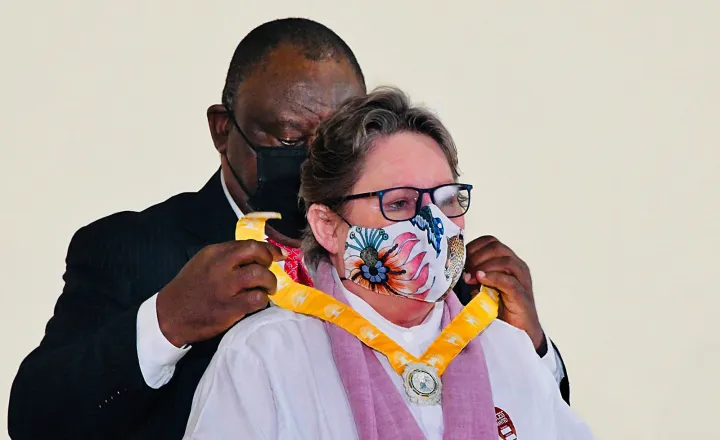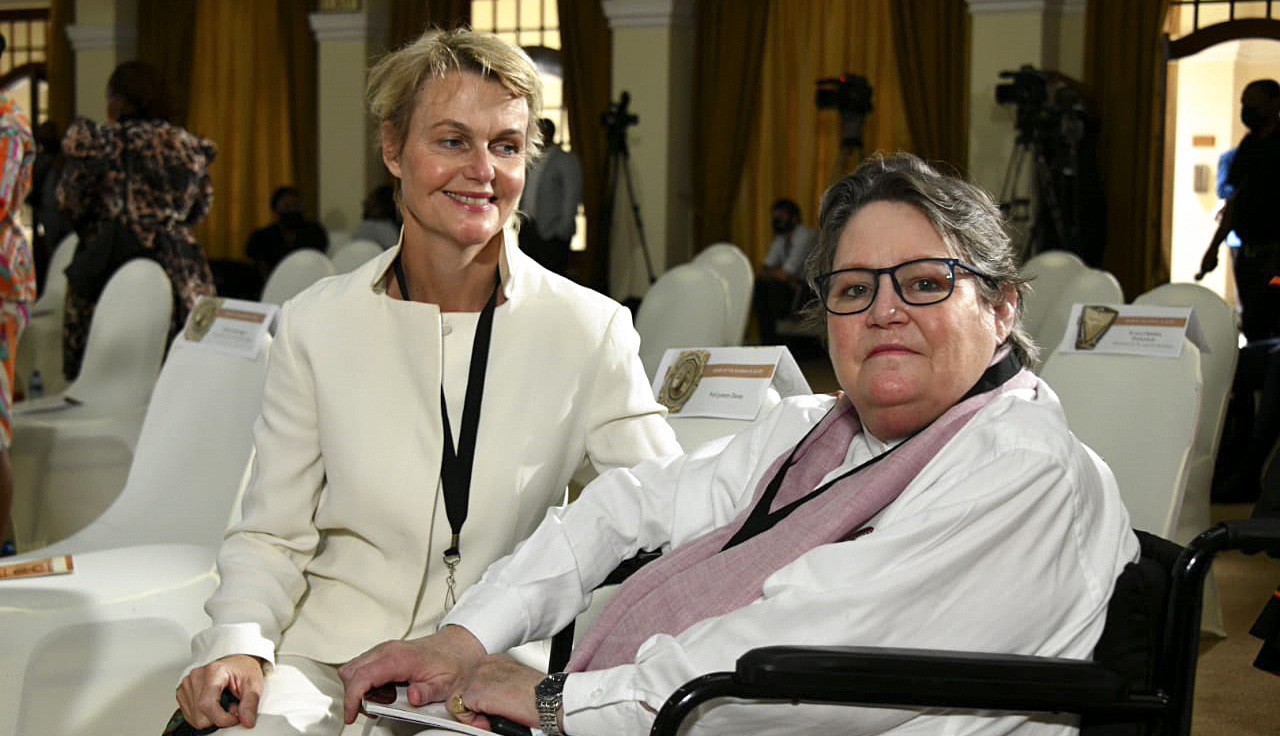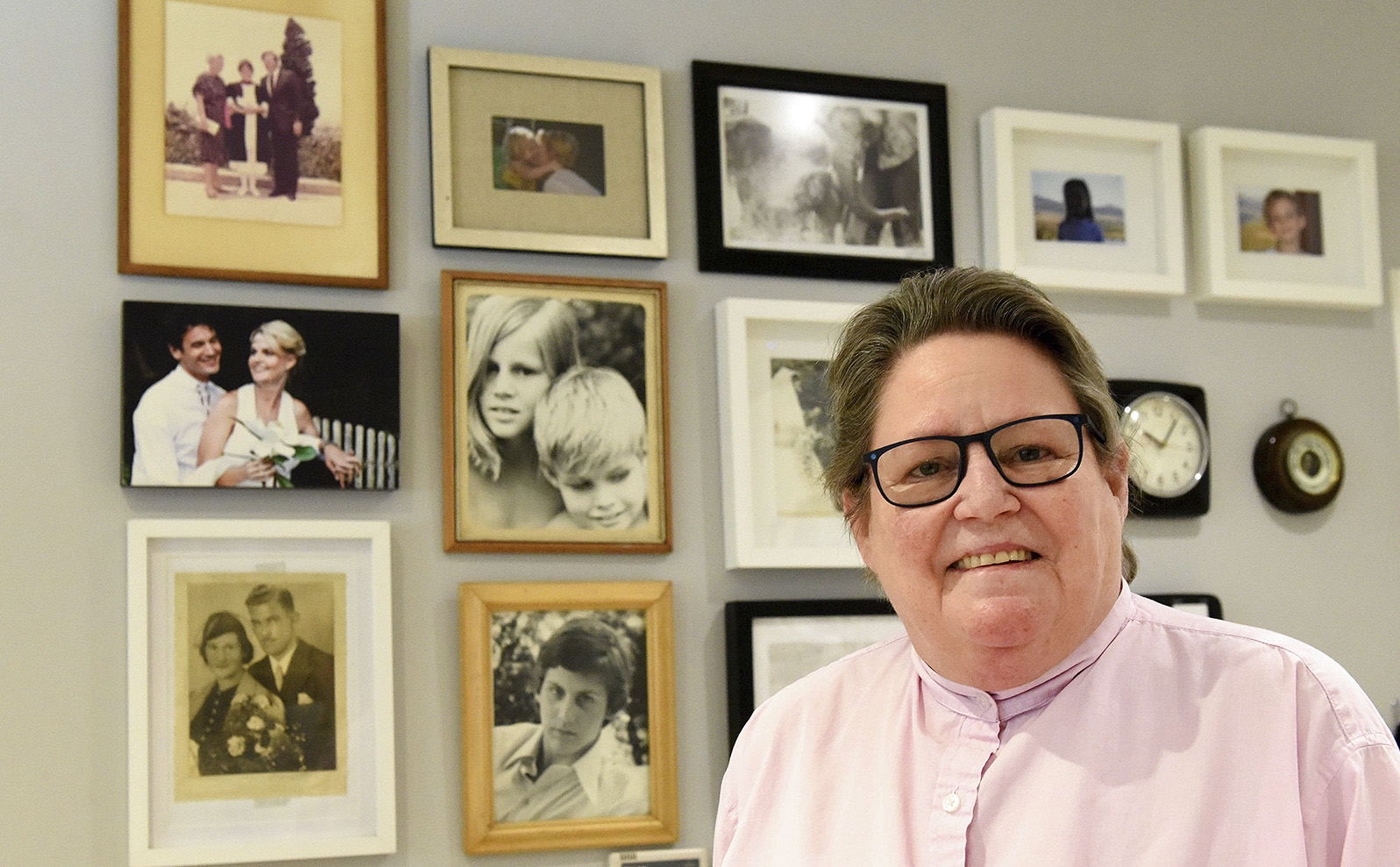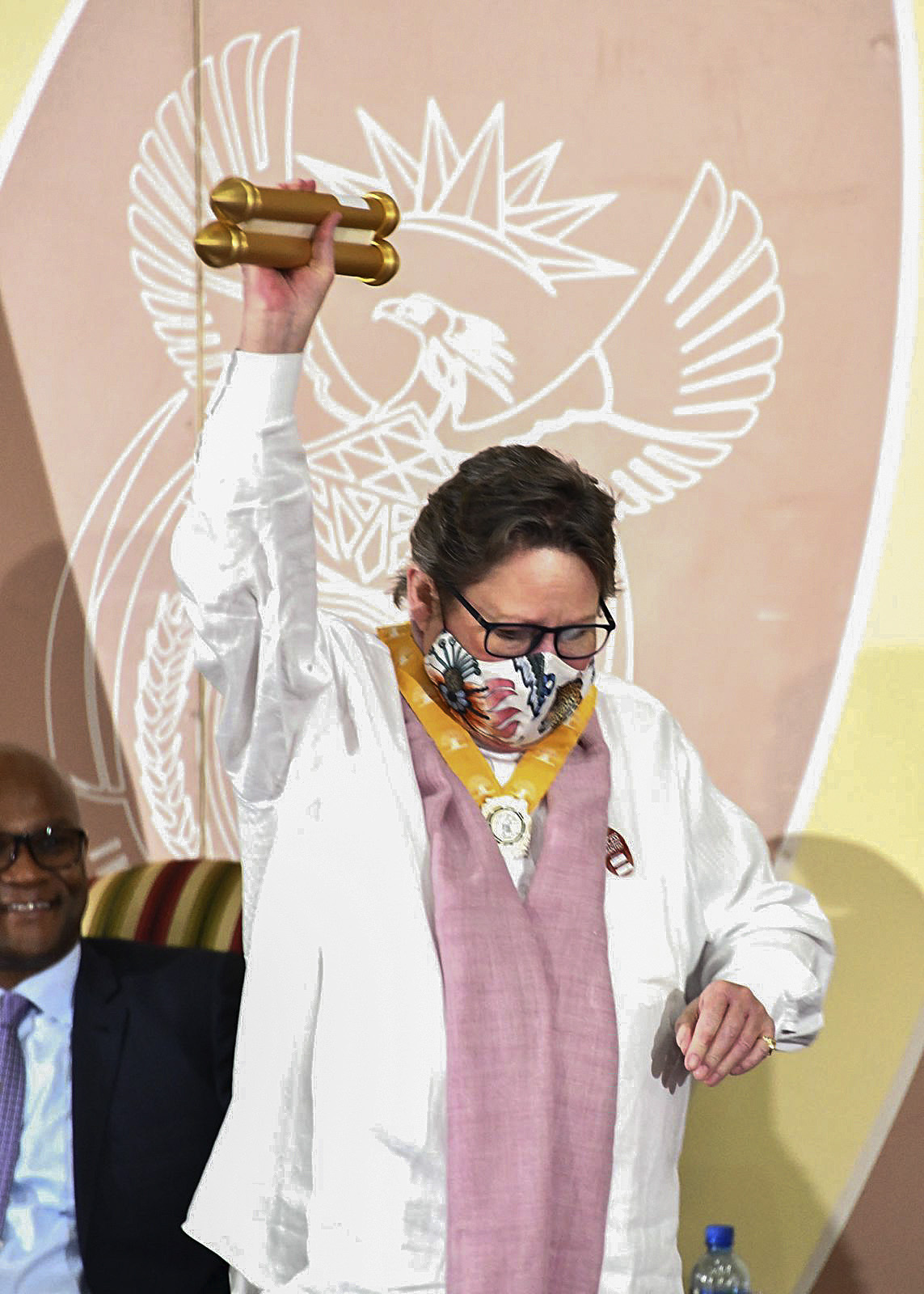SPOTLIGHT: ORDER OF THE BAOBAB
World expert on cervical cancer Professor Lynette Denny reflects on an extraordinary life of service

Professor Lynette Denny of the University of Cape Town recently received the Order of the Baobab, the country’s highest accolade for citizen excellence. Spotlight spoke to her about her groundbreaking research in cervical cancer prevention, her own ongoing struggle with cancer, and the enrichment she has found in being of service.
It could be said that Professor Lynette Denny’s career has been one of selfless dedication to bettering and saving women’s lives in South Africa, particularly those from poor areas. But that would not quite capture the reality, for Denny’s groundbreaking academic and clinical achievements in cervical cancer prevention do not stem from a toiling spirit of self-sacrifice. Hers is a demeanour of exuberance.
Since 1995, when Denny first started exploring pap smear options in collaboration with Columbia University in New York, she has pursued doing what she loves best, even as it consumed most of her days. Friends describe her as a “hermit” and she admits, “I’m very bad. I’ve always been very bad. You know, but balance does not lead to excellence.”
At 63, Denny heads the Department of Obstetrics and Gynaecology at the University of Cape Town (UCT). She has served as chairperson of the non-profit organisation Rape Crisis, and was a driving member of the team that pioneered South Africa’s Thuthuzela Care Centres in 2006, which is a critical part of the country’s anti-rape strategy aimed at reducing secondary victimisation. Peers recall her driving to Groote Schuur Hospital — the academic public hospital affiliated to UCT — at night to operate on rape survivors.

Professor Lynette Denny (right) with her sister Robyn Denny. (Photo: Jairus Mmutle / GCIS)
“I always say, I’m the member of society who keeps the toilets flushing,” she says. “You know, in other words, we do the same thing. We do it every day and we do it forever. We teach people around ourselves and then eventually when I go off into the sunset, it will continue. It’s consistency. There’s a time for rage, to be indignant, and angry… But the key thing for me, you have to be a trunk. You have to stand firm in your belief.”
Time to think
Speaking from her apartment in Green Point, Cape Town, Denny’s words are matter-of-fact, with an occasional reflective bent as she gazes back at her life’s work. Without flinching, Denny relays that her days are numbered. She has metastatic (stage IV) breast cancer, which has spread to her spine.
“Essentially, I have advanced notice of things coming to an end,” she says. “So, I’m getting my life in order. Now, I have time to think about what I’ve done with my life. It’s a journey, you know?”
Asked about her calm in the face of this grave certainty, she shrugs. “Actually, I recently did one of those personality-type tests and came out an engineer. Yes, I am pragmatic,” she says. “We like order.”
Last week, Denny travelled to Pretoria in a wheelchair to accept the Order of the Baobab, South Africa’s highest accolade for citizen excellence. Despite her painful spine, Denny stood next to President Cyril Ramaphosa as he draped the silver medal around her neck.
Finding balance
Inside her apartment, on the kitchen counter, is a paper sheet with a half-painted rose and paint brushes. In a recent bid to introduce some “balance” into her life, Denny has taken up art classes. On the walls are family photos of her parents and four siblings, and her two nieces. Bright tapestried cushions adorn her sofa. They were made by her late mother Mary. It was Mary, a fiery apartheid opponent who left school in Standard 8, who instilled in Denny the sense of social justice that would come to propel her career.
Denny’s formative years were in Durban.
“The strongest influence was my mum,” she says. “So, my mum’s mum was a nurse and her father, in retrospect, probably had bipolar disease. He was an alcoholic and he used to beat my grandmother. So, my mum had an absolute phobia of men who beat women. My mother, from a very young age, said to me [that] no man will ever stand over you. Or be better than you, and you will get educated.”

Professor Lynette Denny at her home in Green Point, Cape Town. (Photo: Nasief Manie / Spotlight)
She recalls early brushes with the injustices of apartheid. “There used to be what were called ‘the blackjacks’, who would come into your house at two o’clock in the morning to raid the staff quarters to see if they had children or boyfriends or friends or anyone else over. There were very strict rules about who could be there. And every time this happened, we would all wake up and my mum [would] be running down and screaming at them, hitting them with a broom. She would be furious and it made a really big impression on me.”
Another influence was Alice Khuzwayo. “She brought me up for the first 10 to 12 years of my life. She was a wonderful woman and I still love her very deeply, although she’s long since dead. I remember going to her room and noticing that they had a toilet that was like, it was like you had to squat on it, like an Asian-type toilet, not like what we had, a sitting flush toilet. So, you know, there were so many incidents of great and small insults to black people.”
Life-saving research
Leaning back in her desk chair, Denny recalls doing her first HPV (human papillomavirus) detection study involving 3,000 women from a caravan set up in Khayelitsha outside Cape Town for her PhD, which she completed in 2000.

President Cyril Ramaphosa bestowed the Order of BAOBAB in Silver to Dr Lynette Denny at the Sefako M Makgatho Presidential Guesthouse in Tshwane. The Order of BAOBAB celebrates Dr Lynette Denny for her contribution to the field of obstetrics, an age-old honourable tradition of ushering new life into earth and ensuring the safety of both mother and child. (Photo: Jairus Mmutle/GCIS)
Today, Denny runs a research clinic in five shipping containers with 10 staff in Site B in Khayelitsha, where women have access to free life-saving HPV screening and treatment. Denny glows, adding that just the day before the interview, she finally got official municipal permission to extend the clinic after having first applied a year back.
“At the moment, we have five shipping containers and then a prefab building,” she says. “Now we’re going to build on to that. We’ll put in toilets, our own toilets, and extra rooms for examining patients and a nice patient lounge. We need more space, more pretty space. I always think that a physical environment is critical to a feeling of wellbeing and being respected.”
Having nurtured her project in Khayelitsha from infancy for more than 20 years, there are many special memories.
“I mean, one of the things I learnt, for instance, through working in Khayelitsha — just a small anecdote,” she says. “We connected up with the traditional healers and women, and I used to go and visit them and talk to them about the work we were doing.” Denny says one of the things she noticed among her patients was their feelings around the vagina and the vulva. “You know, [that] it’s a shameful, dirty thing. And it belongs to my partner anyway, who is usually a male. I picked this up very strongly and realised that we had to change that narrative.
“I mean, the vagina and the vulva and the cervix are the most beautiful part of the body. It’s where life is given, where great pleasure is experienced, and also terrible violence. And so I got hold of this woman who was a praise singer — and it’s very unusual to find black women who are praise singers. We did this exercise where we created vision boards. So, everybody got a piece of newspaper and scissors and glue and magazines and pencils, and everybody put down all their thoughts about their vaginas and we pulled it all together, and this praise singer came up with this poem,” Denny recalls.
“And this was before The Vagina Monologues. And I’ve met Eve Ensler, by the way. I don’t think I have the words exactly right, but the poem was something like ‘The vagina is an apricot. The vagina is like a strawberry. The vagina is beautiful. Kings, Queens, and graduates have been born through the vagina, even Nelson Mandela.’ Isn’t that beautiful? Even Nelson Mandela was born through the vagina… And we started singing it and we went on walks around the township, singing it. You know, and [to] every woman who came, I said, be proud, you know, be proud.”
Be of service
Denny’s hands gesture as she explains the intricacies of HPV. German virologist Harald zur Hausen discovered the link between HPV and cervical cancer, she says, for which he was awarded the Nobel Prize in Physiology or Medicine in 2008. There are more than 170 strains of HPV, most of which resolve spontaneously, but two types — HPV16 and HPV18 –are known to cause lesions, which may result in cervical cancer if not detected in time.
An estimated 10,000 South African women are diagnosed with cervical cancer each year, of whom 6,000 will die from the disease – mostly those from low resourced areas, without access to timely screenings.
“To cut a long story short,” she says. “Because, I mean, we’ve done a lot of work. We are evaluating what we call screen and treat. So, we recruit women aged 30 to 65 and we perform an HPV test using this new method. It’s what we call a ‘point of care’ test. It gives you a result in one hour and tells you whether this woman has one of 14 high-risk types of HPV.” Denny says she thinks this will be her last study. “I’ve had enough now,” she says.
“Then, if suitable, we treat the woman in the same visit with what we call thermal coagulation, which is a device with a sort of stem and you burn the cervix using it for about 20 seconds at a hundred degrees and that destroys the precancerous lesions. It’s painless. But, I mean, we don’t use that language when we talk to patients because they’ll jump off the bed and never come back. We do have a way of explaining it that makes it less scary,” she says.
Her current research involves new artificial intelligence technology called Automated Visual Evaluation — a machine-learning-based algorithm that assesses photographs of the cervix for signs of cancer.
“Don’t ask me the technicalities,” she says. “I don’t understand it. I’m over 60. But you take a photograph of the cervix and send it up into the Cloud and it sends down within three minutes whether the cervix is at risk or not.”
Concluding the interview, Denny says, “And I think, my lasting — [or] what I would like to impart to those who follow me when I leave — is to be able to be of service to your community is a great privilege. It’s not a duty. It’s not a burden.
“Immersing myself in the Khayelitsha community was just so liberating; to lose the sense of othering, to feel connected to humanity, like that has been so enriching. I recommend it.” DM/MC
[hearken id=”daily-maverick/8881″]




















 Become an Insider
Become an Insider
Brava Lynn! so well deserved